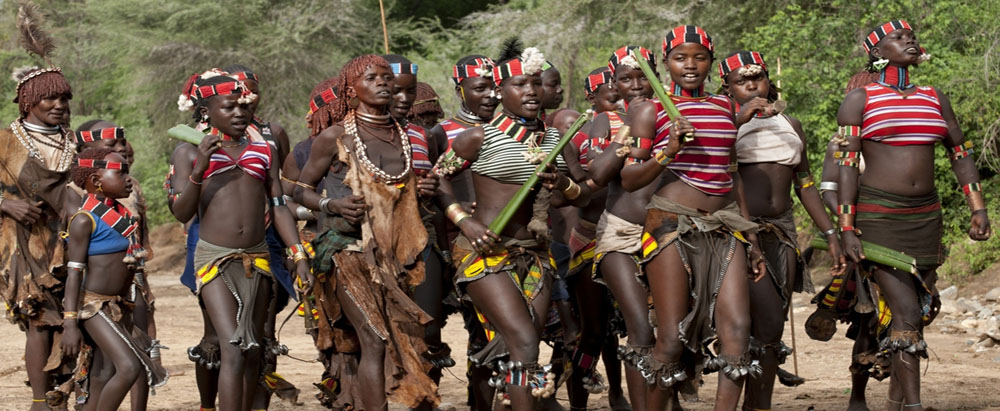CULTURE ATTRACTION

The diversity of people living in Ethiopia is enormous: close to 100 million people divided in over 80 ethnic groups, together speaking over 200 dialects. The relative isolation of the country, never colonized by a foreign power, left a very distinctive identity. Ethiopia is different in every corner! When Ethiopia is presented as a cultural destination it is usually about the tribes in the south of the country. Although we follow this reasoning somehow, it does injustice to the rest of the country and to the people in the south who are so much more than just a 'cultural attraction'
Language
Four major linguistic groups are present in Ethiopia. People speaking Semitic, Cushitic, Nilotic and Omotic languages. The last group of languages only spoken in Ethiopia in the Omo Valley.
Religion
Ethiopia is a country where religions meet. Christianity is the biggest religion with most people (over 50% of the populaion) following the very own Ethiopian Orthodox Church. Around 34% of the population is Muslim and in the south many people follow traditional beliefs.
Foods and drinks
The Ethiopian food is very typical. The staple food is 'enjera' a huge, bit sour tasting, pancake with a spongy structure. It is made from teff a grain unique for the highlands of Ethiopia. The dish is served with al kind of 'wot': meat or vegetable stews. As there are many fasting days on the Ethiopian calendar, it is a perfect country for vegetarians. And even for vegans as fasting means not to take any animal product, including eggs and dairy products. The often spicy food is washed down with the local beer 'tella' and honey wine 'tedj'
Coffee ceremony
Sooner rather than later you will be invited for a coffee ceremony. Coffee originated from the Kaffa region in western Ethiopia. Today it is a big contributor to the economy. Ethiopians are proud coffee consumers, it takes some time to prepare though. The fresh beans are washed and roasted over an charcoal fire. While grinding the beans in a mortar, water is boiled and a first cup of coffee (usually taken with a lot of sugar) is prepared. While enjoying the first serving a second round is prepared by adding extra water in the coffee pot. This is repeated and the ceremony is finished with a third serving which is called 'beraka' (luck) and it is polite to take all three servings. During the ceremony incense is burnt and popcorn and 'kolo', roasted barley, are served as a biting. The floor is covered with fresh grass as a sign of hospitality.
Music and dance
The listing of the unique culture of Ethiopia is endless. Music and dance is also very distinctive and differs from region to region. Instruments like masinko, krar and begena are little known outside Ethiopia. The cultural restaurants in Addis Ababa give a good impression of the music from all over the country, meanwhile you enjoy a wide selection of the delicious Ethiopian food.
Calendar and time
History left Ethiopia with its own calendar based on (but not the same as) the Julian calendar. It consist of 12 months of 30 days and 1 month of 5 days (6 days in a leap year). New year is celebrated on September 11th (12th in a leap year) and the calendar is between 7 and 8 years behind the Gregorian calendar. Hence the slogans: 'Enjoy 13 months of sunshine' and 'Feel seven years younger'
As in more countries near to the equator time is measured in 12 hour cycles starting at sunrise, 6.00 in the morning. 07.00 (7 AM) is 1 o'clock in Ethiopia, noon is 6 o'clock and 18.00 (6 PM) is 12 o'clock.


